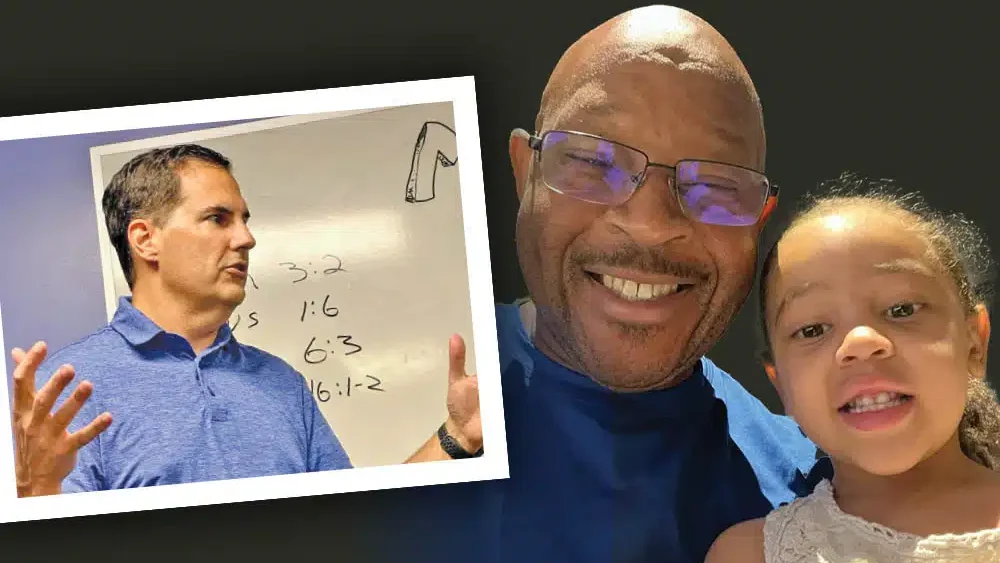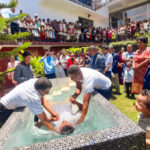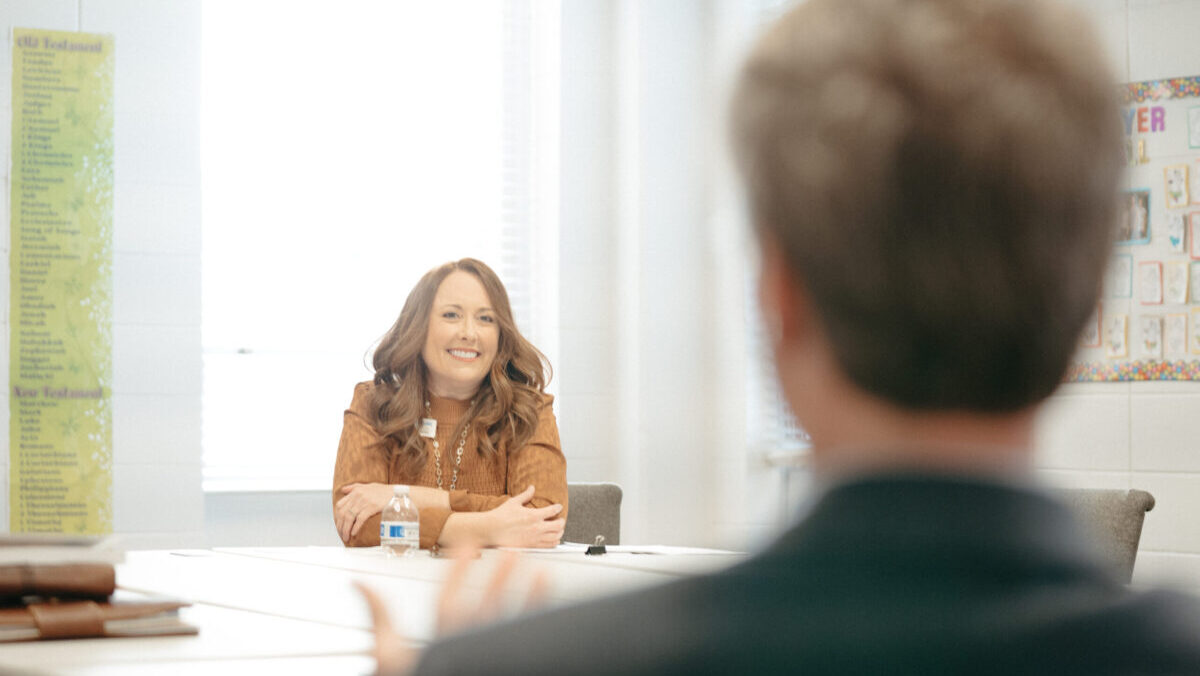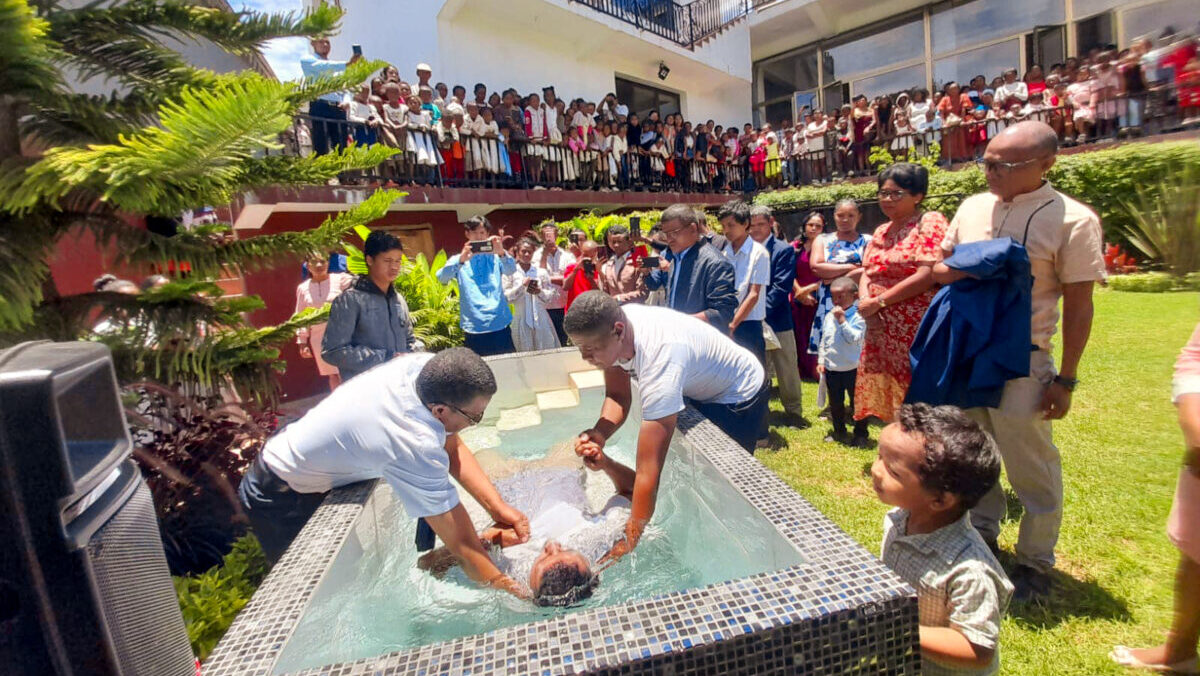Rudy Kebreau and Randal Lyle are bound by far more than their mutual faith and pastoral calling these days. Lyle, senior pastor at Meadowridge Community Baptist Church, gave Kebreau — his next generation and children’s pastor — a priceless gift this summer when he donated a kidney to his friend and associate.
It was an unlikely match made this side of heaven that even astounded transplant doctors who rarely, if ever, see perfect matches between Anglo donors and Haitian-American recipients. Yet, after extensive testing, Lyle met all the markers for donating a kidney to Kebreau.
“God gave me good health and God brought us together,” said Lyle, 52. “We want the Lord to be glorified in this. He put it all together.”
The pastor of the Fort Worth, Texas, church sees the transplant process as an object lesson for his congregation. “We are a multi-ethnic church,” Lyle said. “I think it was a testimony that, in a sense, we are all the same. The issue was never anyone’s background or skin color or anything.”
From Boston to the Metroplex
Kebreau, 48, never expected to leave his native Boston for Texas. But God called and Southwestern Baptist Theological Seminary beckoned, so he and his family moved to Fort Worth.
Kebreau, his wife, and two daughters started attending Meadowridge a decade ago, during his last semester in seminary. Lyle had been the pastor about nine years at that point and Meadowridge was blooming again following a revitalization effort started 10 years prior with the assistance of Wedgwood Baptist Church.
“Everyone [in the family] liked the different departments,” Kebreau recalled about the church. “We decided to make it a home. … We came for the church.”
Soon the church came calling for Kebreau, when Meadowridge’s children’s minister left. Kebreau, who by then had completed a master of arts in Christian school education at Southwestern, had to be persuaded to apply for the job.
“I put in my resume just so everybody would leave me alone,” Kebreau said with a chuckle. “The Lord just did what He was going to do.” Kebreau came on staff in March 2014 and was an immediate blessing, Lyle said.
“It was the Lord’s providential timing,” Lyle said. Little did he or Kebreau understand then just how providential the timing was.
‘Why would I not help?’
Kebreau, who through a variety of circumstances had lost insurance coverage while in seminary, had let his diabetes go unchecked for years. His ankles began swelling and his blood pressure became dangerously elevated. Consultation with a nephrologist revealed Kebreau’s kidneys were failing.
It seemed like the worst news possible.
Kebreau had lost his mother to kidney failure years before. He reluctantly went on home dialysis and was placed on a transplant list at Texas Health Fort Worth. The Kebreaus received the impression it would take years for Rudy to get a kidney.
“The church had been praying for Rudy and trying to figure out how to help him,” Lyle said. “Donating a kidney was not on my radar.” Yet from time to time, he wondered if he could donate.
“Whatever God blessed you with is to bless other people,” Lyle said. “I knew my good health was for more than going to the gym.”
At the same time, Lyle was reading “A Serious Call to a Devout and Holy Life,” a book by 18th century English theologian William Law, a man who influenced George Whitefield and John Wesley. As part of his thesis, Law exhorts wealthy Christians to use their gifts for God’s glory.
Lyle realized that exhortation had deeper implications. “It’s as if the Holy Spirit prompted me, ‘You’ve got an extra kidney,’” he said. “If I have an extra kidney and a brother who needs help, why would I not help?”
Lyle’s wife, Samantha, “didn’t bat an eye” when the pastor gave her the news.
“OK, if that’s what God is telling you to do, go ahead,” she urged.
Lyle submitted the online transplant application and the transplant center contacted Lyle, who was soon undergoing psychological and physical testing and counseling required for potential donors.
“I felt healthy,” he said. “But I didn’t know if I could pass the test. They drew lots of blood. They checked for every disease known to man, did chest x-rays, heart exams, kidney tests, organ tests.”
Not only did the test results come back fine, but Lyle matched every marker needed to be Kebreau’s kidney donor.
The two pastors learned the good news in late March 2023 and announced it to the church in April. At Kebreau’s insistence, they set the date for the procedure for late June, after Meadowridge’s vacation Bible school and following his daughter’s high school graduation in May.
On June 28, Lyle endured a laparoscopic procedure to detach the healthy kidney, although the actual kidney removal necessitated a larger abdominal incision. Two surgeons were present, one to remove the kidney and the other to supervise the preparation and transplant of the kidney to Kebreau, leaving him with a total of three kidneys (the original kidneys are not removed in transplants).
Every day
So far, Kebreau’s recovery has gone well. He recently had his dialysis port removed, takes anti-rejection medicines and must stay in relative isolation at home until December. He hopes to be permitted to go back to his office at church on days when the facilities are empty even sooner.
“I feel great,” Kebreau said.
For Lyle, the recovery has also continued smoothly. He was not allowed to lift anything over 10 pounds for six weeks; it was about eight weeks until he could run again. He has lingering tightness from the abdominal incision but is otherwise back to normal.
Normal, but changed.
During his brief hospital stay, nurses and techs would come in. Many expressed astonishment that he had donated a kidney to a person who was not a relative.
“Seeing their reaction, I realized that every day needs to be a kidney day for me,” Lyle said. “I need to be thinking, ‘How do I show the love of God in such a way that it’s a big deal to someone else?’”
Lyle learned he was only the second living kidney donor so far in 2023 at Texas Health. He told the transplant team he would be happy to talk to others about what to expect.
He said he would do it “100 times again” if he could, advising people to “slow down [and] figure out how to let your light shine before men.”
And make every day “a kidney day.”
EDITOR’S NOTE — This story was written by Jane Rodgers and originally published by the Southern Baptist Texan.








